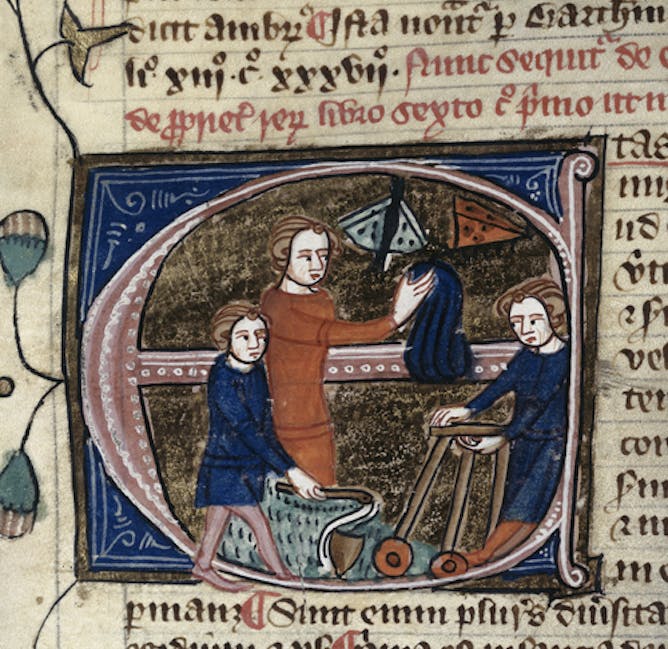| |
|
|
|
|
|
|
| |
|
Editor's note
|
|
The crisis at Oxfam continues after revelations that senior aid workers paid for prostitutes in Haiti and that the charity failed to properly act on information to protect vulnerable people. The government has threatened to cut funding to the charity if it fails to show “moral leadership”. But, as Luisa Enria writes, these aren’t just difficult questions for Oxfam, but for all NGOs working in international development. The hard task now is to begin reform, not threaten foreign aid.
The age at which children enter puberty is dropping, prompting concerns that an earlier onset may be caused by childhood obesity among other things. But bioarcheologist Mary Lewis has been taking a longer view, to medieval times in England, and argues that a comparison between then and now shows not much has actually changed. Looking even further back – some 700,000 years – Matthew Bennett and Sally Reynolds have been using ancient footprints to work out what childhood was like then.
Seeking a new best friend, or just someone to talk to? A US company thinks it has the answer with an AI chatbot that promises to be “a totally unique and faithful digital friend”. Its designers think it could help solve the growing problem of loneliness, and encourage us to get to know ourselves better, but Trudy Barber’s not so sure – isn’t this narcissism gone mad?
|
Gemma Ware
Society Editor
|

|
|
Top story
|

Oxfam: under pressure.
Oxfam East Africa/flickr.com
Luisa Enria, University of Bath
Power imbalances and inequality lie at the heart of the international development industry. But the Oxfam scandal shows that organisations mustn't succumb to it.
|
Arts + Culture
|

Chemistry Cat’s got some knowledge for you.
Know Your Meme
Erhan Aslan, University of Reading
Imma let you finish, but there's more to memes than you think.
|
|
|
-
Stephen Crabbe, University of Portsmouth
The curse of the tattooed ex was well-known in 18th-century Japan.
-
Felia Allum, University of Bath
There are plenty of examples of strong women in the top echelons of organised crime – they don't seem to be there in McMafia.
|
|
Health + Medicine
|

anonymous illustrator/Wikimedia Commons
Mary Lewis, University of Reading
The panic about British children reaching puberty younger is unwarranted. Medieval skeletons provide a different answer.
|
|
|
-
Steve Faulkner, Nottingham Trent University; Katy Griggs, Oxford Brookes University
Techniques and technology can help athletes perform at their best even in freezing temperatures.
|
|
Business + Economy
|
-
Anne Goldgar, King's College London
Bitcoin is being compared to tulips, but I researched tulip mania for years and found no evidence of mass bankruptcies or economic meltdown.
-
Christopher Shoop-Worrall, University of Sheffield
The two papers were once titans of publishing. But their future looks less rosy.
|
|
Science + Technology
|
-
Neil Dagnall, Manchester Metropolitan University; Ken Drinkwater, Manchester Metropolitan University
Proof of time travel, false memories or a parallel universe? A look at the wacky world of the 'Mandela Effect'.
-
Matthew Robert Bennett, Bournemouth University; Sally Christine Reynolds, Bournemouth University
Children in the distant past were put to work early, reveal footprints.
-
Trudy Barber, University of Portsmouth
We should be worried about the development of social skills in a world where everyone can have their 'perfect' AI friend.
-
Clifford Johnson, University of Southern California – Dornsife College of Letters, Arts and Sciences
Seeing black lead characters who are accomplished scientists could be just the thing to help inspire future generations to follow in their footsteps.
-
Bettina Büchel, IMD Business School
Apple's closed system may be its undoing in the smart home market.
|
|
Politics + Society
|
-
Chris Greenough, Edge Hill University
The idea that people can be 'converted' from homosexuality is a dangerous lie – and yet such therapies still aren't banned in the UK.
-
Udo Merkel, University of Brighton
Teams from both countries marched into opening ceremony under the unified Korea flag.
|
|
| |
Featured events
|

|
Arthur Lewis Building, University of Manchester, Oxford Road, Manchester, Manchester, M13 9PL, United Kingdom — University of Manchester
|

|
Bowland auditorium, Berrick Saul building, York, York, YO10 5DD, United Kingdom — University of York
|

|
Dover Street Building, The University of Manchester, Manchester, Manchester, M13 9PL, United Kingdom — University of Manchester
|

|
Wivenhoe Park, Colchester, Essex, CO4 3SQ, United Kingdom — University of Essex
|
|
|
|
| |
| |
| |
| |
| |
|
|
|
|
|
|
|
|